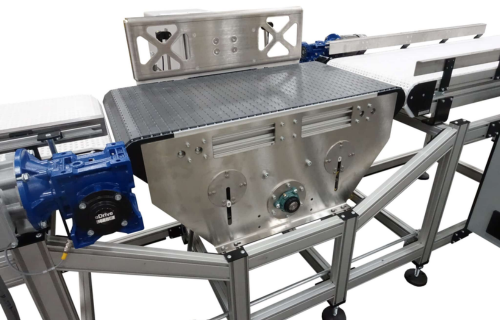Streamlining Material Movement for Enhanced Efficiency
Eka Conveyors Industrial Conveyors offers a comprehensive range of industrial conveyor systems designed to facilitate the efficient movement of products and materials within companies. Our solutions are highly reliable and durable, capable of handling a wide range of loads, from heavy and bulky items to delicate goods. We take pride in customizing our conveyor systems to meet the specific requirements of each application, ensuring optimal performance and productivity.
What Are Industrial Conveyor Systems?
Industrial conveyor systems are purpose-built to swiftly and efficiently transport materials, tailored to suit the unique needs of various applications. These systems find utility in a multitude of settings, including assembly lines, manufacturing plants, construction sites, warehouses, and distribution centers. Our industrial conveyor systems are engineered to enhance operational efficiency, improve safety, and reduce costs.
Applications and Advantages of Industrial Conveyor Systems
Industrial conveyor belt systems offer numerous advantages across a range of industries, including:
Consumer Goods: Conveyors in the consumer goods industry streamline processes such as product transfer, storage, sorting, and packaging, optimizing efficiency, and reducing manual labor.
Material Handling: In manufacturing facilities, industrial conveyors expedite the movement of raw materials and finished products, reducing worker fatigue and expediting processes.
Metal Working: Sturdy and durable industrial conveyors are crucial for handling metal materials and parts safely within manufacturing environments, minimizing risks associated with hazardous machinery.
Automotive: Industrial conveyor systems play a vital role in the automotive industry, enabling the efficient and safe movement of heavy and bulky parts, improving factory safety, and boosting productivity.
Warehousing: Industrial warehouse conveyors efficiently transport goods within warehouses, enhancing operational speed, accuracy, and throughput. They are also helpful in sorting and packaging operations.
Key Components of Industrial Conveyor Systems
Irrespective of their specific functions, most conveyor systems share common components:
Drive: The drive provides the power necessary for conveyor operation. Electric motors are commonly used for modern conveyor systems due to their reliability and efficiency. internally-mounted engine offers high performance for heavy-duty tasks while reducing the system’s footprint.
Controls: Conveyor operation depends on the type of controls employed. industrial conveyors can be seamlessly integrated into automation systems, optimizing performance and freeing up workers’ time. Manual controls offer flexibility for activities such as cross-line navigation and inspection.
Mode of Transfer: Conveyors move materials using various modes of transfer, including belts, chains, buckets, cables, pneumatic controls, screws or augers, and aero-mechanical controls.
Support: The conveyor’s frame is crucial for providing structural support and facilitating the functionality of belts, chains, and other vital components. Easy access for cleaning, maintenance, inspection, and repairs ensures worker safety and system longevity.
Benefits of Industrial Conveyor Systems
Utilizing automatic conveyors in industrial settings offers significant advantages, regardless of the industry:
Enhanced Efficiency: Conveyors reduce labor and time required for material movement, minimizing downtime and increasing overall operational efficiency.
Reduced Costs: By optimizing material movement and reducing manual handling, conveyors enhance production rates, extend equipment life, and minimize wear and tear, resulting in cost savings.
Optimized Use of Labor Force: Automating material handling tasks through conveyors allows workers to focus on critical thinking and problem-solving activities, maximizing the utilization of the labor force. It also improves safety by reducing the risk of manual material handling injuries.
Increased Throughput: Conveyors enable quick and efficient material movement, significantly improving the throughput of operations. Integration with other automated equipment creates rapid and seamless production lines without compromising quality and consistency.
Improved Production Quality & Consistency: Conveyors ensure even and smooth material movement.
Choosing the Right Industrial Conveyor for Your Business
Selecting the appropriate industrial conveyor for your business requires careful consideration of several factors. Here are some key points to keep in mind:
Product Features: Determine the type, weight, and size of the products you need to convey. This will guide you in selecting a conveyor that suits your requirements. For heavier or bulkier objects, consider a robust conveyor. For delicate projects, a modular conveyor series might be more suitable.
Production Environment: Assess the environment where the conveyor will be installed. In clean rooms or dust-free facilities, choose a conveyor system that is easy to clean and maintain.
Intended Use: Define how you plan to use the conveyor. Conveyors have various applications, including material movement, sorting, packaging, palletizing, and product inspection. Select a conveyor that aligns with your specific use case, taking into account speed requirements and usage frequency.
Available Space: Consider the available space in your facility. If you have limited space, look for a conveyor with a small footprint and modular design, such as the FlexMove conveyor. Assess the desired path, including curves and straight lines, as well as the required length for optimal functionality.
Automation Needs: Evaluate the level of automation required in your operation. Choose a conveyor that can seamlessly integrate with your existing automated systems if you have a highly automated facility.
Labor Requirements: Factor in the labor needed to operate and maintain the conveyor system. Opt for a system that is easy to maintain and can be operated safely by your employees. Flexibility, such as those offered by the FlexMove conveyor, may also be beneficial for adapting to changing needs.
Budget: Consider the overall cost, including the initial investment and long-term operating expenses. Strive to find a conveyor system that fits your budget while meeting your business requirements.
Enhance the safety and efficiency of your facility with Eka Conveyor’s Industrial Conveyor Systems. As a leading industrial conveyor manufacturer, we offer innovative solutions that can optimize your production process and improve your business’s bottom line. We can also engineer custom conveyor systems tailored to your specific application needs.
Contact us today to learn more about our industrial conveyor solutions and how they can help you achieve your business goals.


